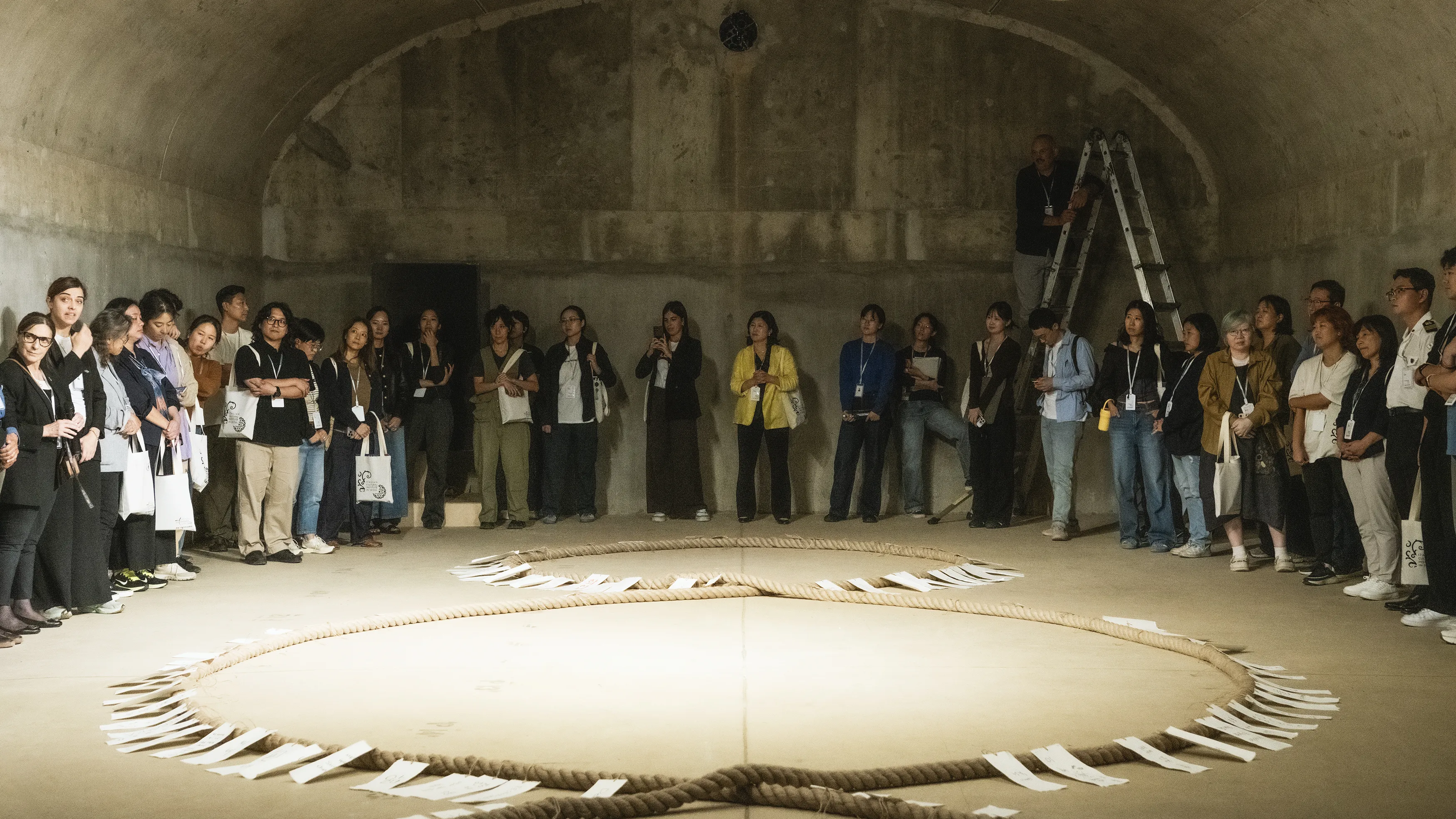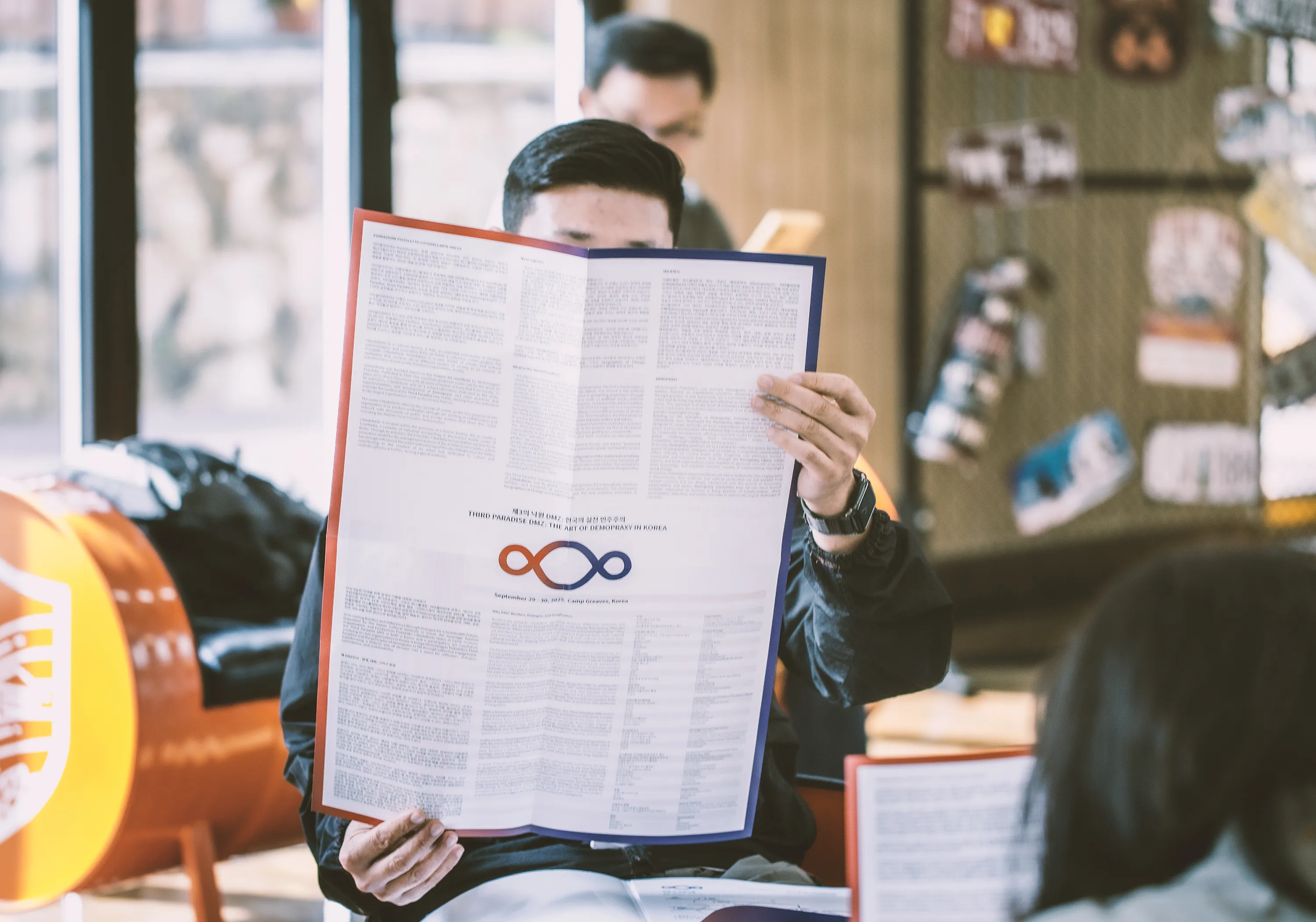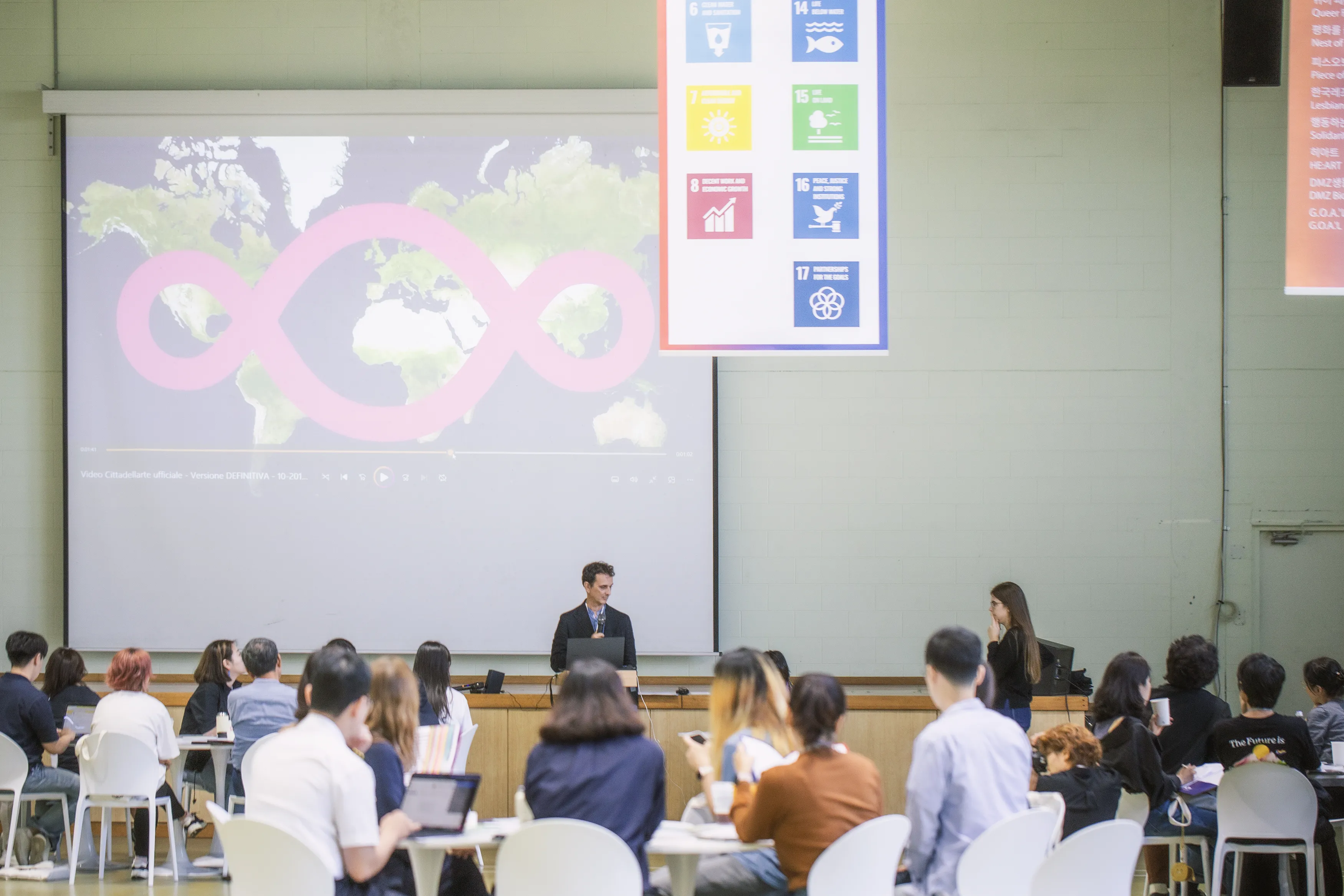What can we
help you find?
Ricerche suggerite

Third Paradise DMZ
On 29 and 30 September 2025 Camp Greaves (Paju, South Korea), hosts the first edition of the Forum "Third Paradise DMZ: The Art of Demopraxy in Korea".
The Forum took place on September 29–30, 2025, at Camp Greaves in Paju, South Korea.
The Italian Cultural Institute in Seoul, under the auspices of the Embassy of Italy in Seoul and the Ministry of Foreign Aff airs and International Cooperation, together with Fondazione Pistoletto Cittadellarte and the Gyeonggi Tourism Organisation, presented the first edition of the Third Paradise DMZ Forum: The Art of Demopraxy in Korea, an event dedicated to the Art of Demopraxy of artist Michelangelo Pistoletto, nominee for the 2025 Nobel Peace Prize. The collaboration between the Italian Cultural Institute and Cittadellarte also led to the establishment of a scholarship for the 2026/2027 academic year at the UNIDEE Academy of Cittadellarte in Biella, open to a student from Korea, in the field of Public Art or Sustainable Fashion.
The event took place at Camp Greaves in Paju, a former U.S. military base transformed into an educational and cultural site by the Gyeonggi Tourism Organisation, located near the Demilitarised Zone (DMZ) at the border between South and North Korea. Curated by Valentina Buzzi and Soik Jung, the project brought together 31 Korean civic organisations aligned with the United Nations 2030 Sustainable Development Goals, following the format of the Demopraxy Opera, whose workshops are currently active in 12 cities worldwide: from Havana to Rome, Biella to Geneva, Nova Gorica-Gorizia to L’Aquila, Ivrea, Busto Arsizio, Brno, Scanno, and now Seoul.
The two-day Forum programme focused on Inclusion and Ecology through fi ve key themes: Solitude, Borders, Care, Resilience, and Praxis—the latter referring to concrete strategies for achieving the other four goals. Together, these themes converged into the idea of Diversity and ultimately toward a broader vision of Peace. The Forum brought together 45 professionals from civil society, social enterprises, research, grassroots activism, and the DMZ community.
Working in five thematic groups—called “cantieri”—participants exchanged ideas and experiences from their respective practices. These sessions off ered participants from diverse backgrounds and fi elds the opportunity to meet, share perspectives, and learn from one another. This cross-pollination enriched the discussions, fostering new ideas and paving the way for transversal collaborations. At the conclusion of the Forum, participants resolved to create a shared communication channel to continue and deepen the exchange. They also drafted a Forum Charter—a collective declaration refl ecting their shared voices and concrete actions. This document now serves as a “map” for ongoing commitment and collaboration, coordinated by the Italian Cultural Institute Seoul and co-curators Soik Jung and Valentina Buzzi.
Among the Forum’s outcomes were announced projects connecting universities and workplaces to strengthen fi eld-based apprenticeships; partnerships between Korean and international bio-pharmaceutical companies; and further development of Preventive Peace as a central theme, with the Art of Demopraxy as the concrete working method. Particularly meaningful among the initiatives was a reconciliation programme between the two Koreas, carried forward by an association of artists who are defectors from North Korea and others from countries torn by tragic conflicts.
The programme also featured a major participatory art performance titled Third Paradise DMZ – Memories to Rebuild the Future, conceived by the curators in collaboration with Francesco Saverio Teruzzi, coordinator of the international network of more than 300 Third Paradise Embassies. Inside the former military bunker of Camp Greaves, a 36-metre-long hemp rope was installed, forming three interconnected circles inspired by Michelangelo Pistoletto’s Third Paradise: a symbol of harmony and dynamic balance between opposites.
On sheets of Hanji—traditional Korean mulberry paper—participants wrote messages envisioning ideas, concepts, and possible desired futures, which they then tied to the rope in a collective gesture. In this way, the installation transformed a place once marked by division and silence into a laboratory of coexistence, where art becomes a practice of preventive peace, weaving together memory and hope.
The work will remain open to the public at Camp Greaves until November 2, 2025. Visitors are invited to add their own messages, which will be collected and later published jointly by Cittadellarte and the Italian Cultural Institute on the dedicated event website.
The Forum was also in harmony with the programme of Camp Greaves’ management and local authorities, who, in parallel with the event, celebrated the historic opening of the Art and Green Ground space under the title From Armistice to Peace.


Paolo Naldini, Director of Cittadellarte - present at the event together with Armona Pistoletto, founding member of Cittadellarte and Director of the Nourishment Office - stated: “Demopraxy is the method through which the dream of democracy can truly be fulfi lled, overcoming both collectivist totalitarian ideologies and individualistic, consumerist ones. To realise this dream, we must begin with the organisations that bring people together in communities of practice—businesses, associations, and every other form of collective structure—because each of them is already in a position to make impactful choices on people’s lives every day; in other words, they hold governance power. The Art of Demopraxy brings awareness to these organisations, provides a method for uniting and cooperating, and lays the foundation for a ‘State of the Art,’ where free creation and responsible engagement are the guiding principles of a constitution that complements and supports existing national ones.”
Michela Linda Magrì, Director of the Italian Cultural Institute in Seoul, declared: “The realisation of the Third Paradise in Korea by the artist Michelangelo Pistoletto confirms the urgent need today to speak about peace and responsibility in our actions. I hope this milestone marks the beginning of a new vision aimed at building a more equitable and compassionate society.”
The co-curators of the event added:
Valentina Buzzi: “As art professionals, we often ask ourselves whether art can truly generate concrete changes in society. We don’t always have defi nitive answers, but bringing the Third Paradise to the DMZ has strengthened my belief that art can indeed facilitate processes of social transformation. Refl ecting on complex concepts such as borders—on which Michelangelo Pistoletto has dedicated much of his research—and reinterpreting them in a broader sense has allowed us to transform the way we understand them, recognising borders not only as lines of separation but as semantic fi elds where the possibility arises to co-create spaces of union, peace, and responsibility toward the future.”
Soik Jung: “While preparing the Forum, meeting people who work with great dedication to help those in need and on issues that deserve our attention was truly moving. It made us realise once again that we should look at the world with the same interest and affection that these people embody. I believe this feeling, this awareness, was shared by all participants in the Forum. Moreover, the people gathered here created a point of contact with activists around the world—one of the most significant aspects of this project.”







